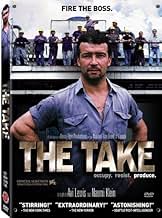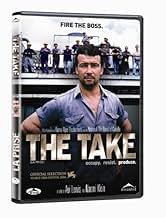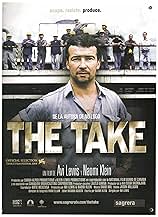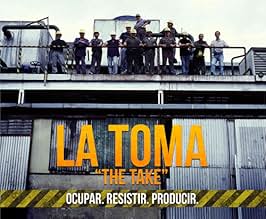IMDb RATING
7.6/10
1.2K
YOUR RATING
In the wake of Argentina's economics collapse of 2001, factory workers break into abandoned factories and restart production. Could these pioneers of cooperative ownership be a model for reb... Read allIn the wake of Argentina's economics collapse of 2001, factory workers break into abandoned factories and restart production. Could these pioneers of cooperative ownership be a model for rebuilding Argentina's economy?In the wake of Argentina's economics collapse of 2001, factory workers break into abandoned factories and restart production. Could these pioneers of cooperative ownership be a model for rebuilding Argentina's economy?
- Awards
- 1 win & 5 nominations total
Bill Clinton
- Self
- (archive footage)
Gustavo Cordera
- Self (singer)
- (as Bersuit)
Carlos Saúl Menem
- Self
- (as Carlos Menem)
Juan Domingo Perón
- Self
- (archive footage)
- Director
- Writer
- All cast & crew
- Production, box office & more at IMDbPro
Featured reviews
No one is more rad-chic than Naomi Klein, with her cool war-resister parents, alternative doctor father and militant feminist mother. She crossed Canada at 16 years old campaigning against nuclear power and wrote a hit book attacking globalisation in her 20s.
Now she has made a feel-good movie out of the economic catastrophe that hit Argentina, by following the weary campaign of unemployed steel workers to join a couple of hundred other factory occupations and take control of their abandoned steel works.
Klein and spouse Avi Lewis were in Argentina for some six months, with a crew of 16 and a budget of about C$1m, so we could certainly expect results. Whether this resounding endorsement of worker co-ops (slogan: Fire The Boss) is quite what the NFB had in mind is not clear.
At a couple of points, I felt the film ruined Argentina offered was about the repulsive imp Carlos Menem and the murderous bourgeois traitors he represented. Who is going to purge those secret policemen who rubbed out some 30,000 lefties? When are those generals going to face a court? Why was Menem not in prison instead of running for president? But the survival tactics of the workers on the ground was a more humane story, and that is to Klein's credit.
Now she has made a feel-good movie out of the economic catastrophe that hit Argentina, by following the weary campaign of unemployed steel workers to join a couple of hundred other factory occupations and take control of their abandoned steel works.
Klein and spouse Avi Lewis were in Argentina for some six months, with a crew of 16 and a budget of about C$1m, so we could certainly expect results. Whether this resounding endorsement of worker co-ops (slogan: Fire The Boss) is quite what the NFB had in mind is not clear.
At a couple of points, I felt the film ruined Argentina offered was about the repulsive imp Carlos Menem and the murderous bourgeois traitors he represented. Who is going to purge those secret policemen who rubbed out some 30,000 lefties? When are those generals going to face a court? Why was Menem not in prison instead of running for president? But the survival tactics of the workers on the ground was a more humane story, and that is to Klein's credit.
This movie helps progressive people address one of the main criticisms of the right and capitalists: what would you do differently if capitalism and globalization is so bad?
Argentina was a country where public utilities had been sold off and money fled the country. Factories were left empty, owing millions of dollars in taxes to various levels of government. The workers thought: we don't have jobs, so we can't buy things for our families. There are no jobs, because people aren't buying things for their families. So they broke the cycle, and with government approval (eventually) occupied the factories and just started producing items for themselves and their neighbors. The co-operative/collectivist movement in Argentina flourished.
The movie shows it was far from easy, and there are many hurdles left to overcome for this country and its people. But it's a hopeful message that if you buy locally, use locally produced services and products produced "locally", you create a viable economic cycle that enriches everybody. You may not have $40 microwaves produced someplace else on the other side of the world, but instead you get a quality product produced by your neighbour, that doesn't require the expense and waste of trans-global shipment. Then, the makers of cheap microwaves will be forced to pay their workers more in order to create a local/national market for their products, rather than using slave labour and shipping the products overseas to the "first world".
Okay, I'm off my soap box. Well done movie with real emotion and appeal.
Argentina was a country where public utilities had been sold off and money fled the country. Factories were left empty, owing millions of dollars in taxes to various levels of government. The workers thought: we don't have jobs, so we can't buy things for our families. There are no jobs, because people aren't buying things for their families. So they broke the cycle, and with government approval (eventually) occupied the factories and just started producing items for themselves and their neighbors. The co-operative/collectivist movement in Argentina flourished.
The movie shows it was far from easy, and there are many hurdles left to overcome for this country and its people. But it's a hopeful message that if you buy locally, use locally produced services and products produced "locally", you create a viable economic cycle that enriches everybody. You may not have $40 microwaves produced someplace else on the other side of the world, but instead you get a quality product produced by your neighbour, that doesn't require the expense and waste of trans-global shipment. Then, the makers of cheap microwaves will be forced to pay their workers more in order to create a local/national market for their products, rather than using slave labour and shipping the products overseas to the "first world".
Okay, I'm off my soap box. Well done movie with real emotion and appeal.
namely that there ARE options available to us all.
8/10 for the message of hope, commiseration for our working/unemployed Argentine brothers and sisters.
6/10 for the quality of the film.
there is so much unhappiness among the people of the world that ARE working, let alone those suffering war, poverty/sickness. Billions of workers' tax dollars bailing out banks and corporations, as decisions by the politicians of canada and the u.s.?!? You need to wake up if you do not realize the intent behind such policies. Why do so many people continue to accept idiotic and heartless "bosses" in the workplace? Their positions of power are supported by fear, and violence. We NEED movies like this at the very least to show us all the glimmer of light at the end of OUR long, dark tunnel..
the direct democracy worked towards by the people filmed here, is the democracy i believe in. for me the most important lesson here is that the workers succeeded with the support of their Community.
great things are possible when we work together.
Occupy.Resist.Produce!
Horizontalidad!!
8/10 for the message of hope, commiseration for our working/unemployed Argentine brothers and sisters.
6/10 for the quality of the film.
there is so much unhappiness among the people of the world that ARE working, let alone those suffering war, poverty/sickness. Billions of workers' tax dollars bailing out banks and corporations, as decisions by the politicians of canada and the u.s.?!? You need to wake up if you do not realize the intent behind such policies. Why do so many people continue to accept idiotic and heartless "bosses" in the workplace? Their positions of power are supported by fear, and violence. We NEED movies like this at the very least to show us all the glimmer of light at the end of OUR long, dark tunnel..
the direct democracy worked towards by the people filmed here, is the democracy i believe in. for me the most important lesson here is that the workers succeeded with the support of their Community.
great things are possible when we work together.
Occupy.Resist.Produce!
Horizontalidad!!
This documentary is the real "Yes, We Can", only instead of an empty political statement it's a true demonstration of "How You Can" make a real change.
When someone tells you that an enterprise cannot run without a boss and a hierarchy of power, don't believe them. Just let them watch "The Take" (La Toma) and see how it's possible to replace the "hierarchy of power" with a "network of cooperation". At first, I didn't believe it myself, but now I know it's possible. Imagine workers cooperating and taking decisions by voting, effectively managing a successful enterprise. Even if the people are inexperienced at first, even if they disagree sometimes, things can be worked out.
"The Take" simply shows something that Capitalism says cannot exist, something that's supposedly impossible: people cooperating for a common purpose, dividing profits equally, taking decisions democratically and managing the enterprise successfully. No leaders, no power struggles, just cooperation. The incentive is the common success, not just personal gain.
"The Take" is even more topical today in the so-called Global financial crisis, because it poses the question: "what should happen to a failed business? Should it be bailed out by the people only to repeat the same mistakes again? Should it be liquidated and sold for scrap metal, leaving the workers without jobs? Or should everything start anew, but this time as a democratic cooperation between workers?" So next time a business fails and the government decides to take your money to save a corporation, know that you have the right to say "NO, I deserve to be compensated. Your factory will do nicely."
I simply cannot express how inspiring and eye-opening this documentary is, you just have to see it for yourself.
When someone tells you that an enterprise cannot run without a boss and a hierarchy of power, don't believe them. Just let them watch "The Take" (La Toma) and see how it's possible to replace the "hierarchy of power" with a "network of cooperation". At first, I didn't believe it myself, but now I know it's possible. Imagine workers cooperating and taking decisions by voting, effectively managing a successful enterprise. Even if the people are inexperienced at first, even if they disagree sometimes, things can be worked out.
"The Take" simply shows something that Capitalism says cannot exist, something that's supposedly impossible: people cooperating for a common purpose, dividing profits equally, taking decisions democratically and managing the enterprise successfully. No leaders, no power struggles, just cooperation. The incentive is the common success, not just personal gain.
"The Take" is even more topical today in the so-called Global financial crisis, because it poses the question: "what should happen to a failed business? Should it be bailed out by the people only to repeat the same mistakes again? Should it be liquidated and sold for scrap metal, leaving the workers without jobs? Or should everything start anew, but this time as a democratic cooperation between workers?" So next time a business fails and the government decides to take your money to save a corporation, know that you have the right to say "NO, I deserve to be compensated. Your factory will do nicely."
I simply cannot express how inspiring and eye-opening this documentary is, you just have to see it for yourself.
The collapse of Argentina's peso in 2001 threw millions out of work and plunged what had been one of Latin America's most prosperous countries in the 1990s into the kind of economic depression not seen in the United States since the 1930s. Four years later thousands of ruined businesses remain closed. In a handful of cases, though, workers occupied and reopened shut factories, health clinics, and schools as employee-owned and operated- cooperatives.
How Argentine workers did this is a terrific story. Unfortunately, "The Take", a film directed and narrated by anti-globalization activists Naomi Klein and Avi Lewis raises more questions than it answers.
According to Klein and Lewis, Argentine workers now run more than 200 companies employing 15,000 people. To explain how this happened, the movie documents a campaign by unemployed machinists to put a casting parts plant back in business. Along the way, we see examples of other successful cooperatives, including a shop of seamstresses, a ceramic tile manufacturer, and a tractor factory.
The new worker owners featured in "The Take" are earnest and enthusiastic. They are especially moving when describing the effects of years of unemployment and how their lives have improved for the better after returning to work. No one, though, tells us basic facts about these companies, such as whether wages and benefits have gone up or down under cooperatives, how the worker-owned companies pay for their raw materials, who buys their products, and if they make a profit. These are not idle points, as any owner Argentine worker or multinational plutocrat -- knows.
How does the "The Take" fill up its time? In between interviews with cooperative members about the glories of worker control we get lectures about the lack of differences among candidates in the 2003 Argentine presidential election, the pointlessness of voting, and the failings of the International Monetary Fund. We're also treated to a long slow motion sequence of a street riot in Buenos Aires complete with Mercedes Sosa soundtrack -- that depicts heroic workers and the equally heroic Klein and Lewis calling each other on their cell phones.
There's a good documentary to be made about what has happened to Argentina's economy and its workers. Klein and Lewis, however, take the easy way out and give us slogans and mushy analysis that leave the audience skeptical and suspicious.
4/10
How Argentine workers did this is a terrific story. Unfortunately, "The Take", a film directed and narrated by anti-globalization activists Naomi Klein and Avi Lewis raises more questions than it answers.
According to Klein and Lewis, Argentine workers now run more than 200 companies employing 15,000 people. To explain how this happened, the movie documents a campaign by unemployed machinists to put a casting parts plant back in business. Along the way, we see examples of other successful cooperatives, including a shop of seamstresses, a ceramic tile manufacturer, and a tractor factory.
The new worker owners featured in "The Take" are earnest and enthusiastic. They are especially moving when describing the effects of years of unemployment and how their lives have improved for the better after returning to work. No one, though, tells us basic facts about these companies, such as whether wages and benefits have gone up or down under cooperatives, how the worker-owned companies pay for their raw materials, who buys their products, and if they make a profit. These are not idle points, as any owner Argentine worker or multinational plutocrat -- knows.
How does the "The Take" fill up its time? In between interviews with cooperative members about the glories of worker control we get lectures about the lack of differences among candidates in the 2003 Argentine presidential election, the pointlessness of voting, and the failings of the International Monetary Fund. We're also treated to a long slow motion sequence of a street riot in Buenos Aires complete with Mercedes Sosa soundtrack -- that depicts heroic workers and the equally heroic Klein and Lewis calling each other on their cell phones.
There's a good documentary to be made about what has happened to Argentina's economy and its workers. Klein and Lewis, however, take the easy way out and give us slogans and mushy analysis that leave the audience skeptical and suspicious.
4/10
Details
- Release date
- Countries of origin
- Official sites
- Languages
- Also known as
- Захват
- Filming locations
- Production companies
- See more company credits at IMDbPro
Box office
- Gross US & Canada
- $30,380
- Opening weekend US & Canada
- $8,625
- Sep 26, 2004
- Gross worldwide
- $30,380
- Runtime
- 1h 27m(87 min)
- Color
Contribute to this page
Suggest an edit or add missing content


















